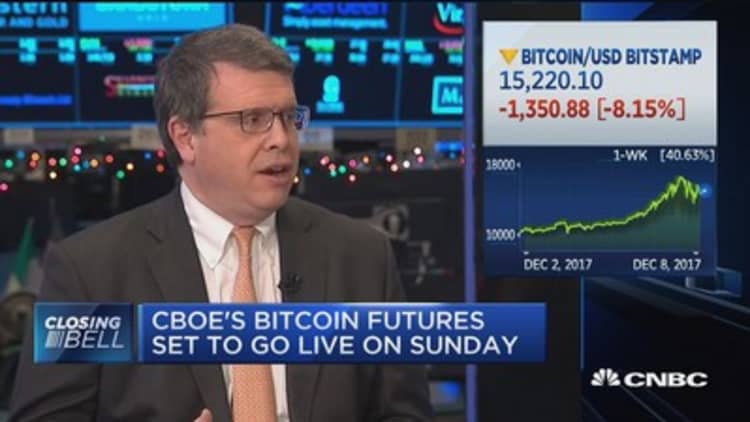
Bitcoin futures are expected to bring some stability to the wild cryptocurrency market, but not at the start.
The Cboe is the first of three U.S. exchanges planning a futures product, and its contract, based on a single coin unit, launches at 6 p.m. ET Sunday.
Some trading firms and brokers plan to stand back and watch the initial action, but others are wading in cautiously into a product that allows the first regulated two-way trade where bitcoin can actually be shorted.
The launch comes on the heels of a dramatic week of trading, where bitcoin rocketed from about $11,000 on Monday morning to above $19,000 Thursday and back down to where it was near $15,000 Friday. The move by the U.S. exchanges could give legitimacy to the cryptocraze, driven by investors worldwide, but not embraced by the biggest financial institutions.
"I think the first hour will be really fun to watch because ... we're at the point where no one knows. I think this is going to be one way or the other, you're going to get a tremendous amount of interest in that first hour or you'll have people sitting around saying, 'What are we going to do?'" said JJ Kinahan, chief strategist at TD Ameritrade.
The Cboe leapfrogged the CME which starts trading its contract Dec. 18 and the Nasdaq, which hopes to launch in the second quarter of next year.
The U.S. exchanges have come under criticism from the Futures Industry Association, a trade group for the world's biggest banks and financial institutions, for rushing to join the cryptocurrency frenzy that many say has all the makings of a giant bubble. The FIA complained that the exchanges did not engage in enough dialogue with the clearing institutions for a product that could be highly volatile and risky.
Another issue for the futures market is that there is no big cash market sanctioned by the financial establishment, so some of those institutions, like JPMorgan and Citigroup, are not planning to initially provide clearing services, according to reports.
The exchanges are actively trying to head off some wild speculation by setting higher than normal margin requirements. The Cboe says it will require a minimum of 40 percent – up from its original 30 percent and about 10 times the amount of margin required on a futures contract on something like the S&P 500.
"My gut says there's going to be some wild volatility and swings in the first couple of days. You're going to see limit up, limit down a lot, and then it'll probably settle down, but I really don't know," said Larry Tabb, founder and head of research at Tabb Group.
Tabb said a problem is there's no real intrinsic value of bitcoin, which trades on a number of different cryptocurrency exchanges at different prices.
"What the futures should wind up doing is reducing the volatility of the product. ... Whether that volatility is at $20,000, $100,000 or $10, I don't know," he said.
Tabb said he sees the biggest issue for individual investors to be the volatility, which could cause their broker to cash them out in a product that has swung 20, 30 percent in a short time frame. "If that happens quickly, you might not have a lot of time to react, so it's really prudent for anybody who takes investor protection seriously to keep a good eye on this thing. So if I was Schwab, or Fidelity, or whatever, I would not be jumping to facilitate this," he said.
Both firms have said they are not entering the market immediately. However, Interactive Brokers plans to offer Cboe futures, but it will have a 50 percent margin requirement and prohibit its customers from taking short positions. Ally Financial said it will offer clients access, but only to the CME product.
"Interactive Brokers is different in that it caters to a more professional crew," Tabb said.
TD Ameritrade says it will monitor volume, trading and the market before it decides to make the futures available. Kinahan said it may take a few days before the firm provides access.
"We'll watch the liquidity and make sure our clients aren't going to be in the Hotel California, where they can get in, but they can never leave. I think we're pretty hopeful that this will end up being a nice product. There's obviously going to be interest in the futures," Kinahan said.
Andrew Keene, founder of AlphaShark Trading, trades cryptocurrencies and he plans to start trading the futures early in the week. He also said he may favor the Cboe product over the CME product because contracts will be cheaper, based on the fact that the CME is basing its contract on five coins versus Cboe's one coin.
"I think institutions want to short it, and they can't short it. I think the run-up from 10,000 to 17,000 … is that a pure coincidence, [heading] into the futures [launch]?" he said. "They'll eventually want to get long."
Keene said there was speculation about that it was institutions jumping into bitcoin this past week, ahead of the launch, so they could hedge short positions.
Keene said the times that bitcoin trading is most active are 6 and 9 a.m. Eastern and 7 p.m. so the early trading could be active.
WATCH: There's never been an easy way to short bitcoin



